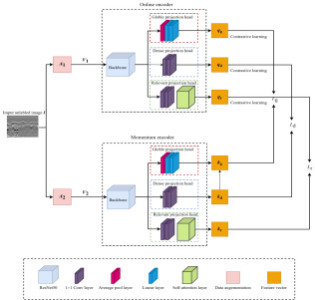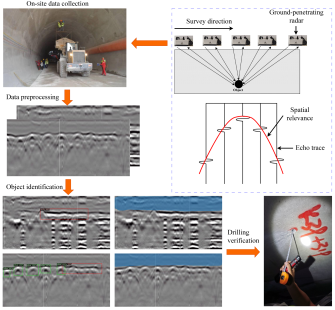Recently, a paper entitled “A deep learning framework based on improved self-supervised learning for ground penetrating radar tunnel lining inspection” completed by the team of associate professor Feng Zhou of this School was published online in the international journal Computer-Aided Civil and Infrastructure Engineering and was selected as the cover article.
The first author of this paper is Huang Jian, a postgraduate of Grade 2020 majoring in Electronic Information of this School, and associate professor Zhou Feng is the corresponding author. Other co-authors are from China Railway Southwest Research Institute, Bauman Moscow State Technical University, Norwegian Geotechnical Institute, University of Aberdeen, and Delft University of Technology.
In response to the common challenge of not practical to obtain a large number of labeled data to train a deep learning network in engineering inspection, this paper, taking ground penetrating radar tunnel lining inspection as an example, carries out research on deep learning methods based on few labeled samples to solve the problem of low recognition accuracy of deep learning models due to the scarcity of labeled data. Based on the spatial correlation characteristics of GPR inter channel waveforms, a deep learning automatic inspection framework based on an improved self-supervised learning algorithm — self-attention for dense contrastive learning (SA-DenseCL) — is proposed. The framework captures correlation information specific to ground penetrating radar data by adding a correlation projection head module to the encoder of the self-supervised learning algorithm, thus enhancing the feature learning capability of the whole model for ground penetrating radar data. The inspection process uses unlabeled data to pre-train the backbone network and combines a small amount of labeled data to fine-tune the target inspection network for automatically identifying the locations of the reinforcement bars and voids and estimating the secondary lining thickness. The experimental results show that even with only a small amount of labeled data, high accuracy inspection of the locations of the reinforcement bars and voids and the secondary lining thickness can still be achieved, and the comparative study finds that this method outperforms the inspection method based on supervised learning pre-training in the case of similar labeled data. This new deep learning framework proposed here can significantly reduce the dependence of target inspection networks on labeled data, which is expected to promote the wide application and implementation of deep learning methods in the field of engineering inspection.
Computer-Aided Civil and Infrastructure Engineering is a top Q1 journal in JCR division of both CAS and Clarivate Analytics, and its impact factor ranks first among international journals in civil engineering, transportation engineering, and infrastructure for several consecutive years, with a latest impact factor of 10.066 in 2022. The journal is known for its rigorous review process, with usually 5-7 reviewers assigned and no more than 10 articles published per issue.
Paper information:
Title: A deep learning framework based on improved self-supervised learning for ground-penetrating radar tunnel lining inspection
Authors: Jian Huang, Xi Yang, Feng Zhou (corresponding author), Xiaofeng Li, Bin Zhou, Song Lu, Sergey Ivashov, Iraklis Giannakis, Fannian Kong, Evert Slob
Source: Computer-Aided Civil and Infrastructure Engineering
DOI: 10.1111/mice.13042
Available online: 19 May 2023
https://doi.org/10.1111/mice.13042
Paper link: https://onlinelibrary.wiley.com/doi/full/10.1111/mice.13042


Fig. 1 Improved deep learning framework Fig. 2 Cover figure